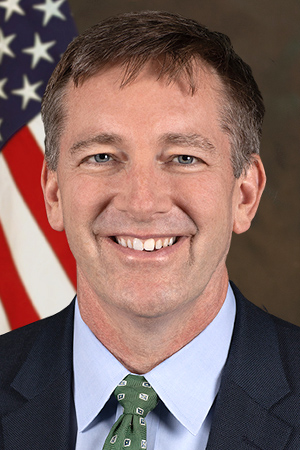Commencement Speaker 2021
Watch the 2021 Speech:
 Col. (Retired) Matthew J. Hepburn, M.D., served as the commencement speaker for the College of Medicine and Life Sciences
ceremony on May 21, 2021, and was also awarded an honorary degree (honoris causa) of
doctor of science.
Col. (Retired) Matthew J. Hepburn, M.D., served as the commencement speaker for the College of Medicine and Life Sciences
ceremony on May 21, 2021, and was also awarded an honorary degree (honoris causa) of
doctor of science.
Dr. Matthew Hepburn was selected by a committee of medical students and faculty from a national pool in recognition of his extraordinary accomplishments. Dean Christopher J. Cooper, M.D., formally nominated Dr. Hepburn, and he was approved by Provost Karen Bjorkman, Ph.D., and the UToledo Board of Trustees.
Dr. Hepburn is currently the Vaccine Development Lead for the Countermeasures Acceleration Group (CAG), formerly known as Operation Warp Speed, a partnership between the Departments of Health and Human Services (HHS) and Defense (DoD) founded in May 2020 to help accelerate the development of COVID-19 vaccines.
Prior to this position, Dr. Hepburn served as the Joint Project Lead of Enabling Biotechnologies for the Joint Program Executive Office for Chemical, Biological, Radiological and Nuclear Defense. In this role, he was responsible for establishing a start-to-finish capability to develop vaccines and therapeutic solutions against current future biological threats. Due to the creation of this foundational capability, Dr. Hepburn and the Enabling Biotechnology team implemented the DoD Vaccine Acceleration Project, which provides key investments to advance vaccines and antibody therapeutic efforts, with special emphasis on acceleration of manufacturing these products and clinical trials. These investments also provided critical initial actions to enable Operation Warp Speed.
Dr. Hepburn served 23 years in the United States Army as an infectious diseases physician, retiring as a Colonel. His final assignment was as a Program Manager at DARPA (Defense Advanced Research Projects Agency), the research and development agency of DoD responsible for the development of emerging technologies for use by the military. Dr. Hepburn served there for nearly six years (2013-2019) and implemented numerous breakthrough investment programs to prepare for the current pandemic. These investments led to improved infectious diseases forecasting, better diagnostics and medical care in resource-limited settings, and development of vaccine and therapeutic products.
A significant investment in rapid antibody discovery and scaling was the Pandemic Prevention Platform aimed at discovery of antibodies and product into clinical trials in 60 days. These investments were applied during the current pandemic, leading to many of the current therapeutic antibody portfolio of investment by Operation Warp Speed and the Department of Defense.
Concurrent with the first two years at DARPA, Dr. Hepburn also served on the research and development team at the Research, Development and Acquisitions Directorate at the Defense Health Agency. From 2010-2013, he served as Director of Medical Preparedness on the White House National Security Staff. In this role, he was responsible for leading interagency policy process to address the lessons learned from the H1N1 influenza pandemic.
Accomplishments included completion of the National Strategy for Biosurveillance, which created the policy framework to support advances in public health surveillance applied for the current pandemic.
Additional assignments have included Chief Medical Officer, Level 2 Treatment facility in Iraq (2009-2010), for which he earned a Bronze Star.
Prior to deployment, Dr. Hepburn was Clinical Research Director at the U.S. Army Medical Research Institute for Infectious Diseases (2007-2009), leading domestic and international clinical research efforts on biodefense products. This role entailed extensive service with the Cooperative Threat Reduction program in the republics of the former Soviet Union. Dr. Hepburn was also an exchange officer to the United Kingdom (2005-2007) and internal medicine chief of residents at Brooke Army Medical Center (2000-2001) at Fort Sam Houston, Texas.
Dr. Hepburn completed his infectious disease fellowship and internal medicine residency training at Brooke Army Medical Center in San Antonio, Texas. He received his medical degree and undergraduate degree in biomedical engineering from Duke University.
Dr. Hepburn addressed graduates at the commencement ceremony on Friday, May 21, at John F. Savage Arena.
Grand Rounds:
Dr. Hepburn also delivered a lecture on Friday morning. Download his slides here. Watch the lecture:


